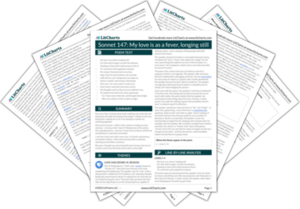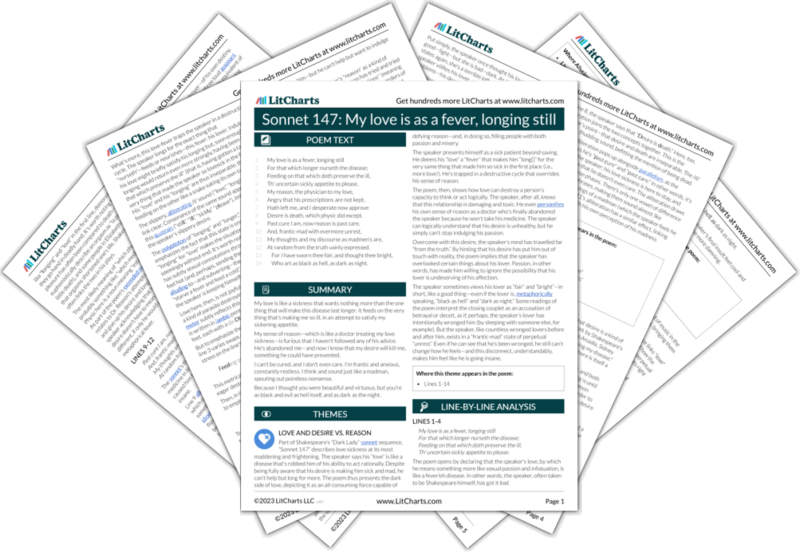
"Sonnet 147" is part of a series of Shakespeare's sonnets addressed to a figure known as the "Dark Lady." In the poem, the speaker compares his love and desire for this person to an illness, one that's robbed him of the ability to act or think rationally. The speaker doesn't even really want help—he just wants more of the same love that's making him so sick! The poem, then, presents obsessive love (and lust) as a painful, irrational, and decidedly unhealthy experience. And while many of Shakespeare's earlier sonnets are filled with adoring praise for a figure known as the "Fair Youth," this poem is far less kind to its subject. In the closing couplet, he turns on the "Dark Lady" and bitterly accuses her of being "black as hell" and "dark as night."
|
Get
LitCharts
|

|

The Full Text of “Sonnet 147: My love is as a fever, longing still”
1My love is as a fever, longing still
2For that which longer nurseth the disease;
3Feeding on that which doth preserve the ill,
4Th' uncertain sickly appetite to please.
5My reason, the physician to my love,
6Angry that his prescriptions are not kept,
7Hath left me, and I desperate now approve
8Desire is death, which physic did except.
9Past cure I am, now reason is past care,
10And, frantic-mad with evermore unrest,
11My thoughts and my discourse as madmen’s are,
12At random from the truth vainly expressed.
13 For I have sworn thee fair, and thought thee bright,
14 Who art as black as hell, as dark as night.
The Full Text of “Sonnet 147: My love is as a fever, longing still”
1My love is as a fever, longing still
2For that which longer nurseth the disease;
3Feeding on that which doth preserve the ill,
4Th' uncertain sickly appetite to please.
5My reason, the physician to my love,
6Angry that his prescriptions are not kept,
7Hath left me, and I desperate now approve
8Desire is death, which physic did except.
9Past cure I am, now reason is past care,
10And, frantic-mad with evermore unrest,
11My thoughts and my discourse as madmen’s are,
12At random from the truth vainly expressed.
13 For I have sworn thee fair, and thought thee bright,
14 Who art as black as hell, as dark as night.
-
“Sonnet 147: My love is as a fever, longing still” Summary
-
-
“Sonnet 147: My love is as a fever, longing still” Themes
-

Love and Desire vs. Reason
- See where this theme is active in the poem.
-
-
Line-by-Line Explanation & Analysis of “Sonnet 147: My love is as a fever, longing still”
-
Lines 1-4
My love is as a fever, longing still
For that which longer nurseth the disease;
Feeding on that which doth preserve the ill,
Th' uncertain sickly appetite to please. -
Lines 5-7
My reason, the physician to my love,
Angry that his prescriptions are not kept,
Hath left me, -
Lines 7-8
and I desperate now approve
Desire is death, which physic did except. -
Lines 9-12
Past cure I am, now reason is past care,
And, frantic-mad with evermore unrest,
My thoughts and my discourse as madmen’s are,
At random from the truth vainly expressed. -
Lines 13-14
For I have sworn thee fair, and thought thee bright,
Who art as black as hell, as dark as night.
-
-
“Sonnet 147: My love is as a fever, longing still” Poetic Devices & Figurative Language
-
Alliteration
- See where this poetic device appears in the poem.
-
Allusion
- See where this poetic device appears in the poem.
-
Assonance
- See where this poetic device appears in the poem.
-
Caesura
- See where this poetic device appears in the poem.
-
Consonance
- See where this poetic device appears in the poem.
-
Extended Metaphor
- See where this poetic device appears in the poem.
-
Parallelism
- See where this poetic device appears in the poem.
-
Simile
- See where this poetic device appears in the poem.
-
-
“Sonnet 147: My love is as a fever, longing still” Vocabulary
Select any word below to get its definition in the context of the poem. The words are listed in the order in which they appear in the poem.
- Nurseth
- Doth
- Preserve
- The ill
- Reason
- Physician
- Prescriptions
- Hath
- Physic
- Physic
- Did except
- Past
- Frantic-mad
- Evermore
- Discourse
- Random
- Vainly
- Sworn thee fair
- Art
-
- See where this vocabulary word appears in the poem.
-
Form, Meter, & Rhyme Scheme of “Sonnet 147: My love is as a fever, longing still”
-
Form
-
Meter
-
Rhyme Scheme
-
-
“Sonnet 147: My love is as a fever, longing still” Speaker
-
-
“Sonnet 147: My love is as a fever, longing still” Setting
-
-
Literary and Historical Context of “Sonnet 147: My love is as a fever, longing still”
-
-
More “Sonnet 147: My love is as a fever, longing still” Resources
-
External Resources
-
The Poem Out Loud — A reading by one of England's finest actors, John Hurt.
-
The First Edition of the Sonnets — See the sonnet in its original context: the 1609 Quarto edition.
-
The Sonnet as a "Little Room" — Listen to a fascinating lecture by the late, great scholar Russ McDonald, which interprets the sonnets in their historical context.
-
The Four Humors — More about the dominant medical system of the 16th century, and how Shakespeare used it in his work.
-
Shakespeare's Sonnets — Find all the sonnets, plus some analysis, in one useful place!
-
In Search of the Dark Lady — An article that investigates the identity of the speaker's lover.
-
-
LitCharts on Other Poems by William Shakespeare
-














